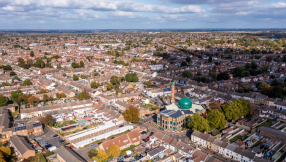ARCIC To Agree on Role of Mary between Anglican & Catholic Church in London
The 43-page document "Mary: Grace and Hope in Christ", also known as the "Seattle Statement", is the fruit of five years of work by international ecumenical delegations of the Roman Catholic and Anglican Communion. The dialogue was sponsored by the Anglican Consultative Council and the Vatican’s Pontifical Council for Promoting Christian Unity.
The statement was completed during a meeting in February 2004 in Seattle. The document, however, has not yet been accepted by the Vatican or the Archbishop of Canterbury. As it is not an authoritative declaration, churches are encouraged to study and evaluate on it.
The ARCIC Co-Chairs, Archbishop Alexander Brunett of the Roman Catholic Archdiocese of Seattle, and Archbishop Peter Carnley, Primate of the Anglican Church of Australia, were present at the celebration of the document's publication yesterday.
The Revd Canon Gregory Cameron, Anglican Co-Secretary of ARCIC, speaking in Seattle said, "This document represents sustained reflection on an aspect of Christian faith in which many Christians have found spiritual strength. It is our hope that all Christians will be helped by this statement to understand why Mary has been a figure of such significance."
The ARCIC is an organisation founded in 1970 following the meeting of Archbishop Michael Ramsey and Pope Paul VI in Rome in 1966. The primary task of its commission is to issue agreed statements on topics that have caused the separation of the Roman Catholic Church and the Anglican Communion, such as Eucharist, Ministry, Salvation and justification, the nature of the Church, morals, authority in the Church, and now, on the role of the Blessed Virgin Mary.
Anglican and Roman Catholic Churches differ in their beliefs on whether Mary was free of original sin and how she was assumed into heaven. Protestants, including the Anglicans, traditionally reject Catholic teachings about Mary, saying there is no Biblical basis for the claims that she was the product of immaculate conception and so free of original sin, or evidence that she was accepted body and soul into heaven upon her death.
The 1.1 billion Catholics and 77 million Anglicans make up the world's two largest organised churches. Anglicanism is traditionally closer to Catholicism than other Protestant denominations that broke with Rome in the 16th-century Reformation.
One of the Co-Chairs of the ARCIC, Archbishop Peter Carnley of Perth, Australia, said to BBC news, the future discussions on the statement would help ease deep-rooted disagreements and the old complaint of the Anglicans that the dogmas about Mary were not provable by scripture "will disappear".
"Mary should no longer be regarded as a church-dividing issue. This document is intended to eradicate that false divide," he added.
The Revd Canon Donald Bolen, Roman Catholic Co-Secretary of ARCIC has prepared an introduction to the document "Mary: Hope and Grace in Christ". Please read online on this website.













